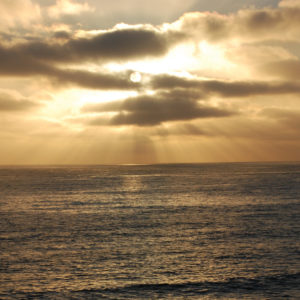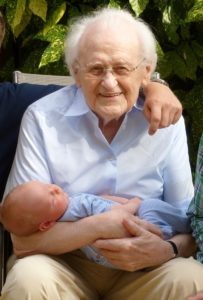This is a short “bonus” posting about some worthwhile podcasts I have been following lately that might be appreciated by Do the Math readers. I’m not a particularly thorough podcast consumer, often having a spotty relationship even with the ones I enjoy. That said, I’ll start with the most recent, and the one that in fact inspired this posting.
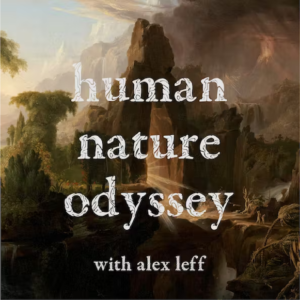 Alex Leff has created what I think is a masterpiece in his first “season” of Human Nature Odyssey. The series is an entertaining, engaging treatment of Daniel Quinn’s 1992 book, Ishmael. I read this book and its companions in 2022, finding powerful and important insights that have stuck with me and grown. I highlight these in an account of my reading journey, and later in a dedicated post. Alex brings humorous life to the story in a richly textured production.
Alex Leff has created what I think is a masterpiece in his first “season” of Human Nature Odyssey. The series is an entertaining, engaging treatment of Daniel Quinn’s 1992 book, Ishmael. I read this book and its companions in 2022, finding powerful and important insights that have stuck with me and grown. I highlight these in an account of my reading journey, and later in a dedicated post. Alex brings humorous life to the story in a richly textured production.
I can’t say personally how well the series would work without first reading Ishmael, but I suspect it would still work quite well as a stand-alone experience (Alex intended it to be able to work). I can say that I enjoyed it enough to run through twice. I won’t rule out a third pass—which would be a personal first for any podcast series. So, it receives my highest recommendation. Give it a try, and tell friends and family about it if you enjoy it. No, I am not getting paid or compensated in any way!
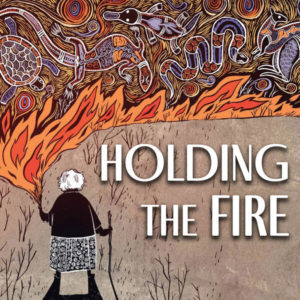 Dahr Jamail followed his 2020 book The End of Ice with a palliative book together with coauthor Stan Rushworth called We are the Middle of Forever, which presents perspectives from a variety of Indigenous voices within North America (Turtle Island). Holding the Fire expands the effort, in audio form, to an international set of Indigenous people who have wisdom to share. I am struck by the common themes offered by people from such different environments and cultural histories. These commonalities can’t be coincidence, and might light the way for long term success: living on this planet as humble participants within a community of life.
Dahr Jamail followed his 2020 book The End of Ice with a palliative book together with coauthor Stan Rushworth called We are the Middle of Forever, which presents perspectives from a variety of Indigenous voices within North America (Turtle Island). Holding the Fire expands the effort, in audio form, to an international set of Indigenous people who have wisdom to share. I am struck by the common themes offered by people from such different environments and cultural histories. These commonalities can’t be coincidence, and might light the way for long term success: living on this planet as humble participants within a community of life.
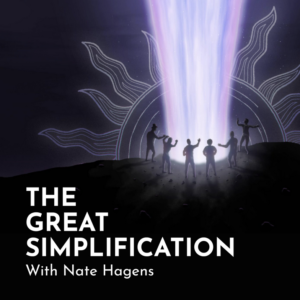 I have referenced a few inspirations from this series, by Nate Hagens, in previous posts. Nate talks to leading scholars, thinkers, practitioners, and activists in the world who are engaging with the meta-crisis in various ways. Nate encourages systems thinking that is not ecologically blind, energy blind, materials blind, etc. It is rewarding to learn that others in the world are thinking about these topics, although the number of guests whose narrow focus appears to result in one or another “blindnesses” is its own sort of lesson as to how rare a broad perspective on the meta-crisis is—but Nate gracefully and gently probes some of the blind spots. Besides the regular series (featuring guests), Nate also creates a sidecar “Frankly” series of shorter installments addressing relevant pieces of the puzzle.
I have referenced a few inspirations from this series, by Nate Hagens, in previous posts. Nate talks to leading scholars, thinkers, practitioners, and activists in the world who are engaging with the meta-crisis in various ways. Nate encourages systems thinking that is not ecologically blind, energy blind, materials blind, etc. It is rewarding to learn that others in the world are thinking about these topics, although the number of guests whose narrow focus appears to result in one or another “blindnesses” is its own sort of lesson as to how rare a broad perspective on the meta-crisis is—but Nate gracefully and gently probes some of the blind spots. Besides the regular series (featuring guests), Nate also creates a sidecar “Frankly” series of shorter installments addressing relevant pieces of the puzzle.
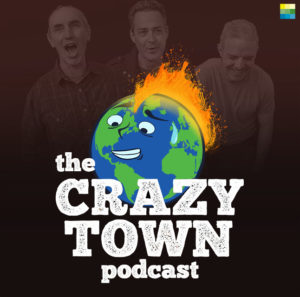 Jason Bradford, Rob Dietz, and Asher Miller—in association with the Post Carbon Institute—gather (in the same room, no less!) to chew on topics and trends relevant to the meta-crisis. These are fun conversations, with lots of good-humored jabs at each other. All three are very insightful, compassionate, and well-informed. Their episodes on mega-wankers like Elon Musk are entertaining, as part of a series on “Phalse Prophets.”
Jason Bradford, Rob Dietz, and Asher Miller—in association with the Post Carbon Institute—gather (in the same room, no less!) to chew on topics and trends relevant to the meta-crisis. These are fun conversations, with lots of good-humored jabs at each other. All three are very insightful, compassionate, and well-informed. Their episodes on mega-wankers like Elon Musk are entertaining, as part of a series on “Phalse Prophets.”
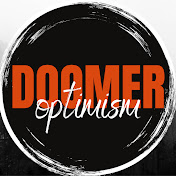 Finally, I am less familiar with this series except that I was a guest on the recent episode 195. That’s right: they’re approaching 200 episodes. Among other guests, they have had Bill Rees, Daniel Schmachtenberger, John Michael Greer, Richard Heinberg and Kate Raworth. While I have not explored this one very thoroughly, I resonate with the title, as I am doomerish when it comes to modernity, while remaining oddly optimistic when it comes to humanity.
Finally, I am less familiar with this series except that I was a guest on the recent episode 195. That’s right: they’re approaching 200 episodes. Among other guests, they have had Bill Rees, Daniel Schmachtenberger, John Michael Greer, Richard Heinberg and Kate Raworth. While I have not explored this one very thoroughly, I resonate with the title, as I am doomerish when it comes to modernity, while remaining oddly optimistic when it comes to humanity.
This statement brings me back to the Ishmael-based podcast (Human Nature Odyssey) mentioned at the top of this post: we can enact other stories going forward—stories of respect, awe, and reciprocity.
Views: 1779


